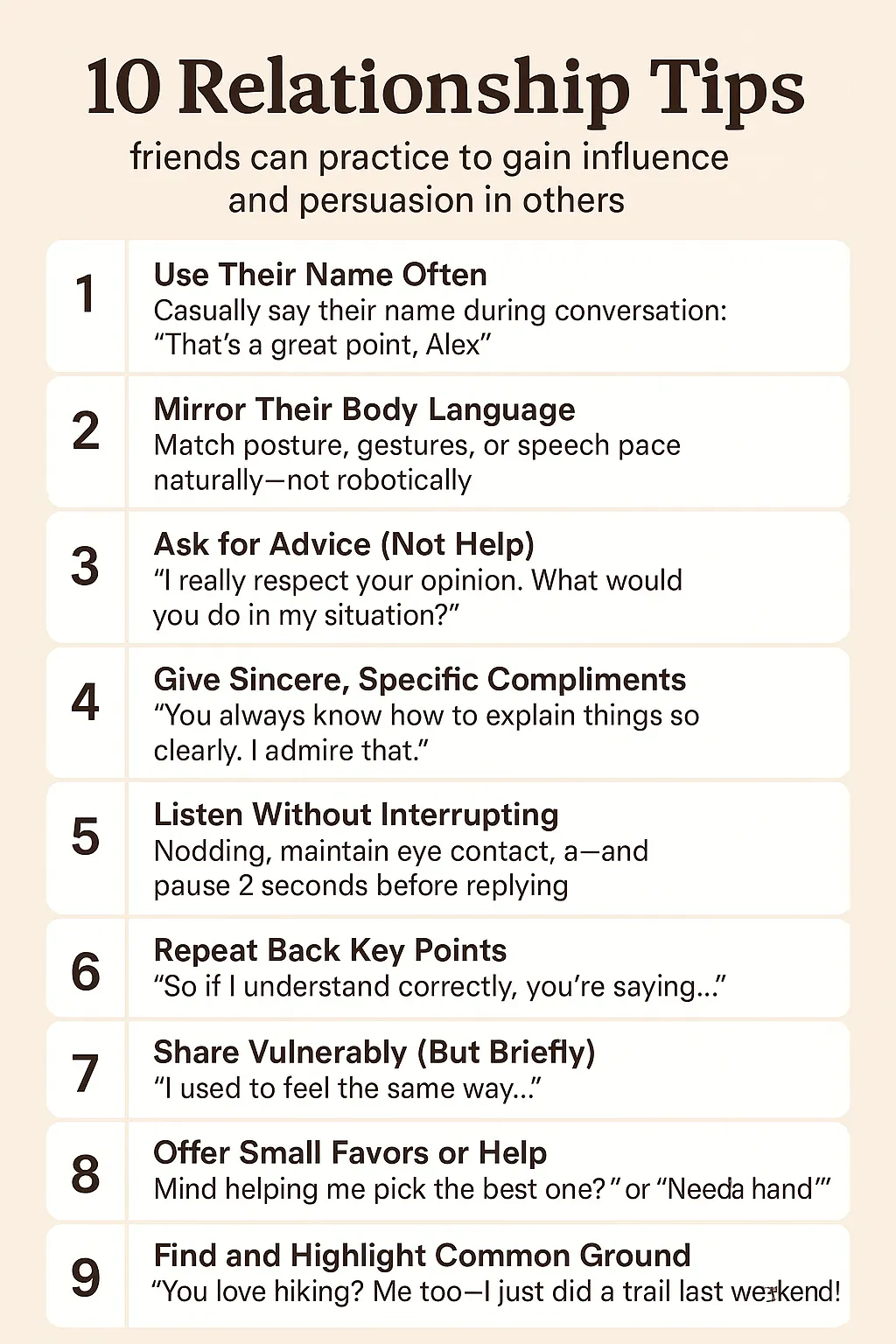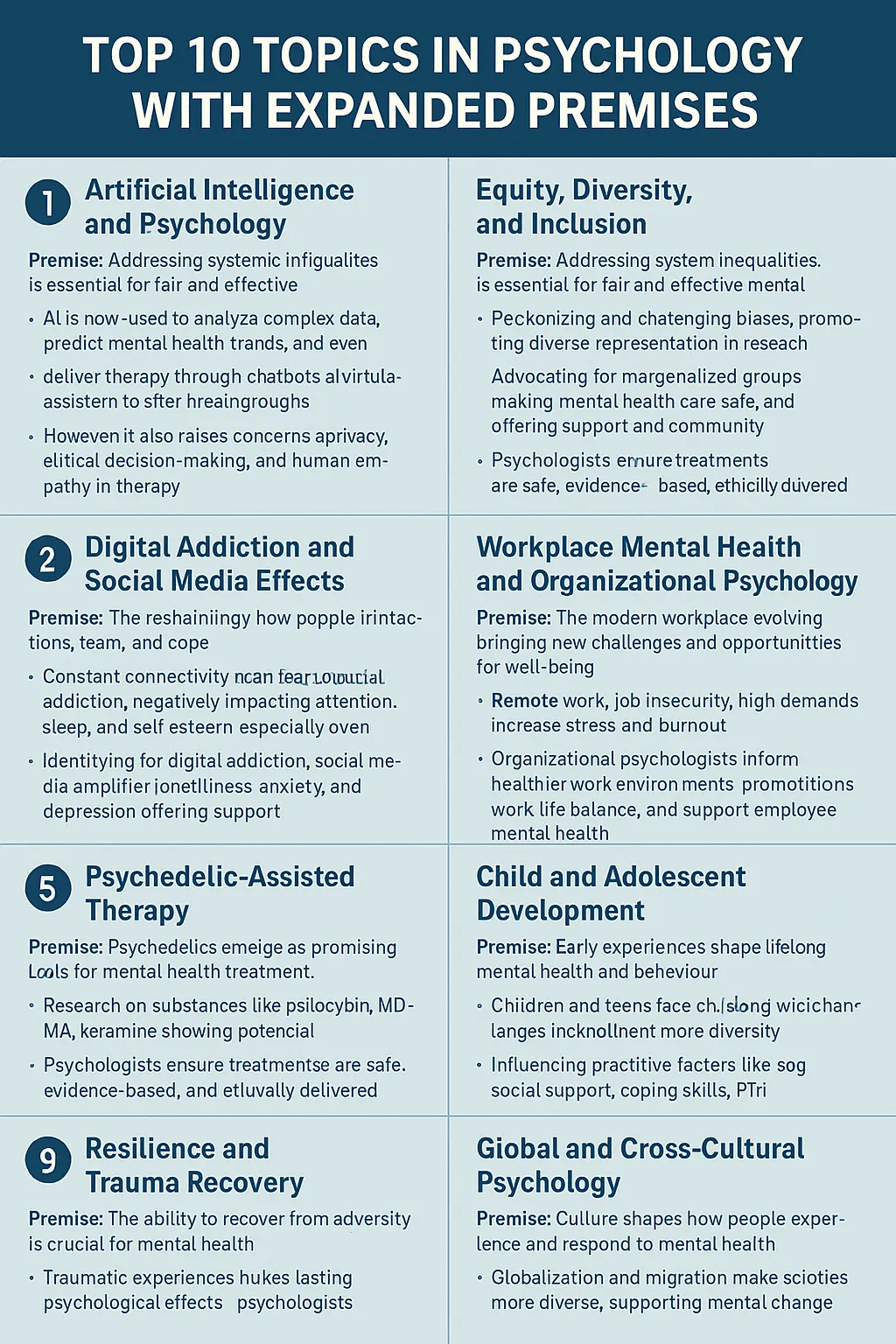10 Practical Relationship Tips to Instantly Gain Influence and Persuade others

In today’s fast-paced world, the ability to connect, influence, and persuade is more valuable than ever. Whether you’re networking, collaborating, or simply building friendships, the science of social psychology and emotional intelligence offers powerful tools to help you stand out. Here are ten practical, research-backed strategies you can start using today to deepen relationships, build trust, and become more persuasive-without being manipulative.
1. Use Their Name Often
Why it works:
A person’s name is, to them, the sweetest sound in any language. Dale Carnegie famously emphasized this in his classic, How to Win Friends and Influence People. Using someone’s name grabs their attention, signals respect, and forges a personal connection.
How to do it:
Sprinkle their name naturally into conversation, especially when greeting them or emphasizing a point. For example, “That’s a great point, Alex.” Avoid overdoing it, which can feel forced. The key is to make it feel genuine and attentive.
Click here to learn smart budgeting, strategic spending, and modern saving techniques to maximize your financial potential.
2. Mirror Their Body Language
Why it works:
Mirroring-subtly matching another person’s posture, gestures, or speech patterns-builds unconscious rapport. Studies show that people feel more comfortable and connected with those who act like them.
How to do it:
If they lean forward, you lean forward. If they speak softly, lower your voice. This isn’t about mimicry; it’s about tuning into their energy and rhythm. Done naturally, mirroring makes interactions smoother and more harmonious.
3. Ask for Advice (Not Help)
Why it works:
Asking for advice, rather than help, empowers others and makes them feel valued. It taps into a person’s desire to be seen as knowledgeable and trustworthy-a phenomenon known as the “advice-giving effect.”
How to do it:
Say, “I really respect your opinion. What would you do in my situation?” This simple shift frames the other person as an expert and builds goodwill, making them more likely to support you in the future.
4. Give Sincere, Specific Compliments
Why it works:
Generic praise feels hollow, but specific compliments show you’re paying attention and truly value the other person’s qualities. This deepens bonds and boosts your likability.
How to do it:
Instead of “Good job,” try, “You always know how to explain things so clearly. I admire that.” The more precise your compliment, the more meaningful it feels.
5. Listen Without Interrupting
Why it works:
Active listening is one of the most powerful ways to make someone feel valued and understood. It’s a cornerstone of emotional intelligence and a key ingredient in trust-building.
How to do it:
When someone is speaking, resist the urge to jump in. Nod, maintain eye contact, and wait a couple of seconds after they finish before replying. These small gestures signal respect and patience, making the other person feel truly heard.
6. Repeat Back Key Points
Why it works:
Reflecting back what you’ve heard demonstrates active listening and ensures you’re on the same page. It also helps clarify misunderstandings and builds alignment.
How to do it:
Use phrases like, “So if I understand correctly, you’re saying…” or “Let me make sure I got this right…” This technique not only reassures the speaker but also cements your reputation as a thoughtful communicator.
Click here to learn smart budgeting, strategic spending, and modern saving techniques to maximize your financial potential.
7. Share Vulnerably (But Briefly)
Why it works:
Vulnerability is the foundation of trust. When you share a small personal struggle or learning moment, you invite others to do the same, creating a sense of mutual openness.
How to do it:
You don’t need to bare your soul-just a brief, relevant anecdote will do. For example, “I used to feel the same way when I started here…” This shows humility and relatability, making you more approachable and trustworthy.
8. Offer Small Favors or Help
Why it works:
Surprisingly, people like you more after they do you a small favor-a phenomenon called the “Ben Franklin effect.” It flips the script: when someone helps you, they subconsciously justify it by deciding they must like you.
How to do it:
Offer or request small, low-stakes favors. “Mind helping me pick the best one?” or “Need a hand with that?” These tiny gestures create a sense of partnership and reciprocity.
9. Find and Highlight Common Ground
Why it works:
Similarity breeds connection. Social psychology shows that people are more easily persuaded by those they perceive as similar to themselves.
How to do it:
Listen for shared interests, experiences, or values, and bring them up naturally. “You love hiking? Me too-I just did a trail last weekend!” This creates instant rapport and makes your interactions feel more authentic.
10. Stay Calm and Warm in Disagreements
Why it works:
How you handle conflict says a lot about your emotional intelligence. Staying calm, warm, and respectful-even when you disagree-commands respect and makes others more receptive to your perspective.
How to do it:
Maintain a soft tone, steady body language, and use phrases like, “I see your point-here’s another way to look at it…” This approach keeps the conversation constructive and positions you as a thoughtful, trustworthy influencer.
Bringing It All Together
Building influence and persuading others isn’t about manipulation-it’s about genuine connection, empathy, and trust. By integrating these ten tips into your daily interactions, you’ll not only strengthen your relationships but also become a more effective, respected, and persuasive communicator.
Remember, the most influential people aren’t those who talk the loudest, but those who listen deeply, connect authentically, and make others feel seen and valued. Start practicing these habits today, and watch your personal and professional relationships flourish.
Click here to learn smart budgeting, strategic spending, and modern saving techniques to maximize your financial potential.













